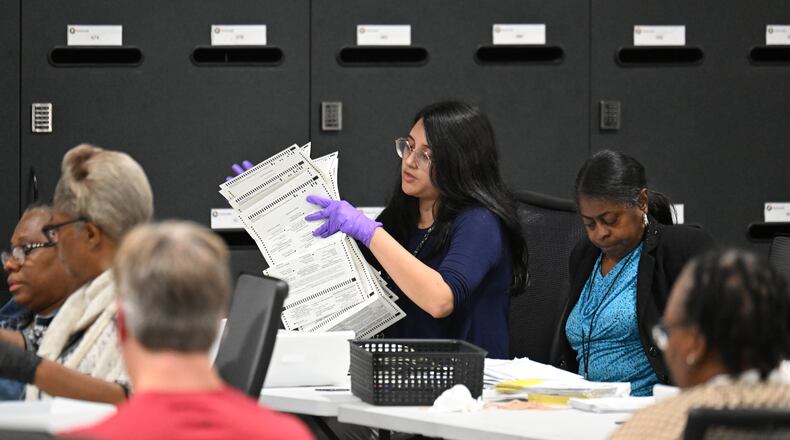A first-of-its-kind audit showed a nearly identical match to the election night count by using technology to read the text on all 5.3 million Georgia ballots.
The audit — required by state law to check the accuracy of voting machines — revealed just 87 discrepancies from all races.
Almost all the inconsistencies were caused by unclear marks on absentee ballots that required human review, according to an audit report released Monday.
“The ballot image audit shows again that the votes in Georgia were counted accurately, securely and quickly,” Secretary of State Brad Raffensperger said. “The image audit shows that our system works accurately and can be trusted.”
The recheck of the results scanned the names of every candidate in all 1,955 races and added up vote totals.
Then the audit compared its count with the totals from election night, which relied on ballot scanning machines that tabulate votes from QR codes printed on ballots.
It was the largest ballot image audit ever conducted, according to Enhanced Voting, the company hired to perform the review after it won a $1.5 million state contract. Ballot images are available for public review on the secretary of state’s website.
Credit: HYOSUB SHIN / AJC
Credit: HYOSUB SHIN / AJC
“There were zero differences found between the tabulation based on the human-readable text and the tabulation based on the QR codes generated by the Dominion ImageCast X ballot marking devices,” Enhanced Voting’s audit report states. “In every instance, the human-readable text on the paper ballots matched the votes represented in the QR code on that ballot.”
Georgia’s voting system uses a combination of touchscreens and printers to create a paper ballot for in-person voters. About 5% of voters returned absentee ballots, which are filled in by hand and then scanned.
Just one discrepancy occurred on ballots submitted through touchscreen, and the inconsistency was traced to a human error in counting a write-in vote, according to Enhanced Voting.
The remaining 86 vote discrepancies were resolved by a human review of bubbled-in ovals on absentee ballots that couldn’t be interpreted by machines, such as a checkmark, dot or scribbled-out choice. In each county, adjudication panels reviewed and counted those ballots before results were certified.
In the presidential race, the audit counted five fewer votes for Republican Donald Trump and 14 fewer for Democrat Kamala Harris.
Official results showed that Trump won the race by 115,100 votes, a 2.2 percentage point margin of victory.
The latest audit, which used optical character recognition technology, followed a hand-count audit completed last week.
The manual audit showed 11 more votes for Trump and six fewer for Harris out of nearly 750,000 ballots reviewed. Raffensperger said the difference was largely caused by human error during the hand-counting process.
Critics of Georgia’s voting technology say it remains vulnerable to potential malware or hacks that could change results.
Marilyn Marks, who leads an election security organization that advocates for hand-marked paper ballots, said the review doesn’t solve the problems of encoding votes by machines.
“Image audits cannot be relied on, although they are helpful in locating discrepancies but should not be considered the ground truth,” said Marks, executive director for the Coalition for Good Governance.
Tight margins in Georgia’s closest races remained the same in the audit, including a race for the state House separated by just 48 votes, where Democratic Rep. Mack Jackson defeated Republican Tracy Wheeler for a Sandersville seat.
The audit was completed before Raffensperger and Gov. Brian Kemp certified statewide election results Friday. But the details of its findings weren’t released until a report was completed Monday.
Soon, winning candidates will take office across Georgia and the country.
For the presidential race, Congress meets on Jan. 6 to count electoral votes, and then Trump will be inaugurated Jan. 20.
About the Author
Keep Reading
The Latest
Featured



